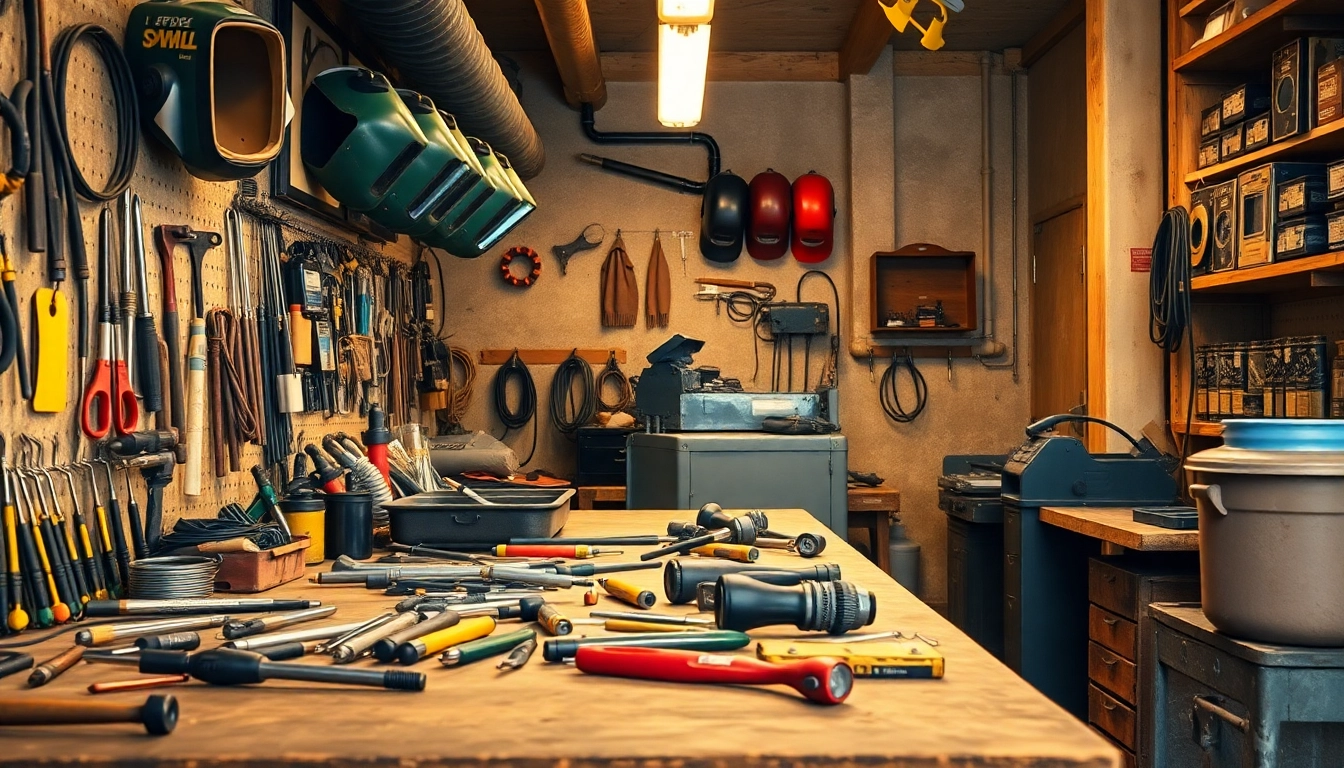Understanding Welding Supplies
Welding supplies encompass a wide array of tools, equipment, and materials essential for any welding process. From the most basic items to advanced machinery, understanding the variety and function of these supplies is crucial for both novice and experienced welders. The right welding supplies can significantly improve the quality of your welds and enhance safety during operations.
The Basics of Welding Supplies
Welding is a fabrication process that joins materials, typically metals or thermoplastics, through the use of high heat. There are several categories of welding supplies, each designed for specific types of welding, including MIG (Metal Inert Gas), TIG (Tungsten Inert Gas), Stick welding, and others. Understanding these supplies can enhance your skills and improve efficiency in your projects.
Types of Welding Equipment
Welding equipment can be broadly categorized into three main types: welding machines, welding accessories, and safety gear.
- Welding Machines: These are the core units that generate the heat required for welding. Common types include MIG welders, TIG welders, Stick welders, and multi-process welders.
- Welding Accessories: This includes items like welding torches, electrodes, welding wires, and clamps. These supplies facilitate the actual welding process and need to match the specific welding technique used.
- Safety Gear: Personal protective equipment (PPE) such as helmets, gloves, jackets, and respirators is mandatory to ensure safety. Welders are exposed to various hazards, including UV radiation, heat, and toxic fumes.
Choosing the Right Supplies for Your Needs
Selecting the right welding supplies depends largely on the type of projects you plan to undertake. Beginners may prefer MIG welding for its ease of use, while seasoned professionals might opt for TIG welding for delicate work. Consider the following factors when choosing your supplies:
- Project Type: Understand the welding process required for your specific project.
- Material Being Welded: Different materials may require different welding techniques and supplies.
- Budget: High-quality supplies may come at a premium, so it’s essential to balance quality with budgetary constraints.
Essential Safety Gear in Welding
Whether you’re a professional welder or a DIY enthusiast, prioritizing safety is paramount. Welding poses several risks, including exposure to harmful radiation, extreme heat, and flying debris. Appropriate safety gear can mitigate these risks significantly.
Importance of Protective Equipment
Protective equipment serves as a barrier between the welder and potential hazards. The following are critical aspects of welding safety:
- Radiation Protection: Welding produces ultraviolet (UV) and infrared (IR) light. Prolonged exposure can damage the skin and eyes.
- Heat Resistance: Protective gear helps shield against extreme temperatures that can cause burns.
- Injury Prevention: Safety gear is essential to prevent injuries from sparks, spatter, and sharp objects during the welding process.
Key Safety Items: Helmets, Gloves, and More
Essential safety gear includes:
- Welding Helmets: These protect the eyes and face from bright light and flying debris. Look for helmets with a variable shade lens for greater protection.
- Welding Gloves: Quality gloves offer dexterity while protecting against heat and UV radiation. Leather gloves are commonly recommended for their durability.
- Protective Clothing: Flame-resistant jackets and pants are essential to protect the skin against sparks and heat. Look for clothing made from hundred percent cotton or specialized materials.
- Respirators: Fumes produced during welding can be toxic. Using a respirator can help filter harmful substances from the air.
Maintaining Your Safety Gear
To ensure optimal protection, regular maintenance of safety gear is essential. Here are a few maintenance tips:
- Regularly inspect helmets for cracks or damage and replace when necessary.
- Wash and care for gloves and clothing according to the manufacturer’s instructions to prolong their life.
- Store all equipment in a clean, dry place to prevent degradation.
Top Brands for Welding Supplies
Choosing high-quality brands ensures that you receive reliable and durable products. The market offers a variety of brands known for their performance, safety, and reliability.
Overview of Leading Brands
Some of the top brands in the welding supplies industry include:
- Miller Electric: Renowned for their advanced technology and user-friendly designs, Miller Electric offers a range of welding machines and accessories.
- Lincoln Electric: A pioneer in the welding industry, Lincoln Electric is famous for its variety of welding equipment and consumables.
- ESAB: Known for its innovative tools and quality products aimed at different welding processes.
- Hypertherm: Best known for their plasma cutting systems, Hypertherm also offers industrial-grade welders.
Comparing Prices and Quality
When evaluating welding supplies, consider both price and quality. While it may be tempting to choose the cheapest option, investing a little more often leads to better performance and longevity. The market price for welding supplies varies widely, and a higher price doesn’t always guarantee better quality. Research and customer reviews are essential in making informed decisions.
Brand Loyalty and Customer Reviews
Brand loyalty plays a significant role in the selection of welding supplies. Customers often return to brands they trust based on their experiences. Checking online reviews and testimonials can provide valuable insights into product performance and customer satisfaction. Websites such as forums, social media groups, and retailer review sections can serve as excellent resources.
Where to Buy Welding Supplies
The choice between purchasing welding supplies online or from local shops can significantly affect your buying experience. Each has its advantages and disadvantages.
Online Retailers vs. Local Shops
Online retailers provide the convenience of browsing a vast selection of products from the comfort of your home. Comparatively, local shops allow you to see and test products before purchase. Many professional welders prefer online shopping for its broader range and often better prices. However, local shops can offer immediate availability and personalized service.
Evaluating Shipping and Return Policies
When purchasing supplies online, it is crucial to consider shipping costs and return policies. Look for providers that offer free shipping on large orders and have straightforward return procedures. Understanding the return policy is essential, as it allows for returns if the item does not meet expectations or is defective.
Finding Deals and Discounts
Many retailers offer seasonal sales, discounts for bulk orders, or loyalty programs. Always check for coupons or promotional codes before making a purchase, as these can significantly reduce costs. Subscribing to newsletters from your preferred suppliers can also provide advance notice of special offers.
Frequently Asked Questions About Welding Supplies
As a welder, you might have several questions regarding the selection and use of welding supplies. Here are some commonly asked questions and their answers.
Common Welding Supplies Questions
Some of the most frequently asked questions include:
- What does every welder need?
Essential items include a welding helmet, jacket, gloves, ear protection, and welding magnets. - What are the different types of welding?
Common types of welding include MIG, TIG, Stick, and Flux-Cored welding. - How do I maintain my welding equipment?
Regular cleaning, proper storage, and scheduled maintenance can extend the life of your welding equipment.
Maintaining Your Equipment
Effective maintenance of welding supplies is crucial for performance and safety. Some tips include:
- Keep your equipment clean and free from debris.
- Check for wear and tear regularly to prevent malfunctions.
- Follow manufacturer guidelines for maintenance schedules.
Advanced Supplies for Professional Welders
Professional welders often require advanced supplies tailored to their specific needs, such as:
- Multi-process welding machines that allow for versatile project handling.
- Specialized nozzles and tips designed for different welding techniques.
- Advanced safety gear for those working in high-risk environments.



